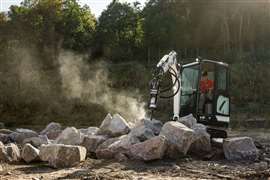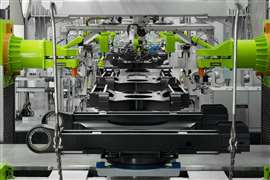Aurelia shows her teeth
06 February 2013

The offshore industry requires high specification materials of all kinds to ensure safety and to meet rigorous fit-for-purpose requirements. The steel pipes and bars that it consumes in day-to-day operations are no exception.
Spanish steel mill Tubos Reunidos SA, whose headquarters is at Amurrio, near Bilbao in northern Spain, is a specialist supplier to the sector. It operates three plants, one of which is also at Amurrio and which consists of a steel making plant and a seamless pipe manufacturing unit. The latter, with a production capacity of 300,000 tonnes per year, manufactures hot and cold finished seamless tubes with an outer diameter of between 26.7 mm. and 180.0 mm with wall thicknesses varying between 2.5 mm. and 16 mm., in carbon steel and alloyed steel (up to 9% Cr and 1.5% Mo).
The Amurrio facility also produces steel billets that are used as prime material. Unusually, the plant carries out its production overnight and weekends rather than during weekdays – that way the it can take advantage of the lower energy costs available as a result
The company’s manufacturing process includes a rigorous quality control effort to ensure that its output meets the demanding specifications of its customers. As a result, it generates a volume of steel, in pipe, billet and rail form, which fails to conform and is therefore rejected before it leaves the mill. Tubos Reunidos has routinely recycled this material by having it cut into 1.5 m (4.9 ft) lengths that are then transported to the foundry where they are incorporated back into the smelting process for new steel. On average, 4,000 tonnes of pipes, billets and rails per month have to be processed in this way.
Until recently, this was carried out manually by a total of 18 workers wielding cutting torches. These workers were specifically employed by a sub-contractor by contractor Redena, who coordinated their work. However, Tubos Reunidos asked Redena to look for an alternative method of doing the work that would provide improvements in safety and environmental impact, as part of a general tightening of its policies covering both these aspects of its day-to-day operations.
Redena decided that mechanising the process was the answer, so it took delivery of ‘Aurelia’, a 25 tonne Genesis GXP2500R demolition shear. This Redena paired with a second hand Liebherr 984 Litronic tracked excavator, which is the smallest excavator size that has the ability to wield and power the GXP25000R, the largest tool of its type produced by Genesis. This machine/attachment combination cuts up the pipes and billets, while a second excavator equipped with a special rail cutting attachment processes this material type.
What’s in a name
The headline of this article needs some explanation! Genesis gives each of its large shears its own personal feminine name. This practice actually originated from the personnel involved in the production process, and began with the very first shear from the company’s German factory.
In 2011, the company decided to further develop the concept and use it as part of its marketing because in the company’s view, it shows that every shear is unique and gets the detailed attention it requires, attention that extends into its after-sales service.




